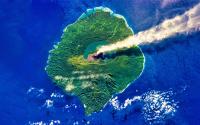1 Februay 2006Steve Holland
US President George W. Bush said on Tuesday "America is addicted to oil" from the Middle East and must break its dependence, in a State of the Union speech that promised aggressive American engagement around the world in defiance of critics.
The former oilman outlined a green agenda in a 52-minute speech that was interrupted at least 60 times by applause. He called for improving technologies in order to reduce US oil imports from the Middle East 75 percent by 2025.
Looking to restore confidence in his leadership, Bush stood before members of the Congress and the rest of Washington's power elite in the House chamber to map out an election-year agenda for Republicans with a speech that was at times optimistic and at others combative.
And while he vowed to work to improve the tone of debate in Washington, he stuck to national security themes that may be crucial to Republican hopes in November, defending a domestic spying program that has Democrats outraged, and telling his harshest critics on Iraq that "second-guessing is not a strategy."
With three years left in office, Bush is hoping to lift his political fortunes and those of his Republican allies in an election year with control of Congress up for grabs. He is coming off one of the toughest stretches of his presidency, and his job approval ratings hover in the high 30s to low 40s in most polls.
Soaring gasoline prices are a central factor in Bush's fall from grace with Americans. Oil prices are close to record levels and Exxon just reported record profits of $10.7 billion in the fourth quarter of 2005.
"America is addicted to oil, which is often imported from unstable parts of the world," Bush said. "The best way to break this addiction is through technology."
BREAK DEPENDENCE ON FOREIGN OIL
He set a six-year goal for making the alternative fuel ethanol practical and competitive, and vowed to fund additional research into ways to make ethanol not just from the commonly used corn but also from wood-chips or grasses.
The goal, he said, is to "move beyond a petroleum-based economy, and make our dependence on Middle Eastern oil a thing of the past."
Critics doubted Bush ever really severed his ties from the oil industry and were sceptical he would put the kind of effort into conservation and alternative-fuel research they say is needed. His previous energy initiatives have had little impact on prices or supplies.
"The president said tonight that Americans were addicted to oil but this administration is addicted to oil companies, and we won't achieve energy independence until the administration breaks its addiction," said New York Democratic Senator Charles Schumer.
BUSH HAS DONE 'OPPOSITE'
Senate Minority Leader Harry Reid, a Nevada Democrat, said it was not credible to hear Bush talk about "making America more secure and honouring our troops or making America energy independent or making health care more affordable without hearing him explain why he's done just the opposite for the last five years."
Bush vowed the United States will remain aggressively engaged around the world and will reject the temptation of protectionism and isolationism under his watch.
He said he would never give up in his battle against radical Islam, and that America's enemies and friends should be certain: "The United States will not retreat from the world, and we will never surrender to evil."
The comments amounted to a rejection of those Democrats and others who argue US policies in Iraq and in the war on terrorism are doing more harm than good abroad.
On Iraq, Bush argued against Democrats who have been calling for a timetable for a phased redeployment of US troops in Iraq, saying a "sudden withdrawal of our forces from Iraq would abandon our Iraqi allies to death and prison."
He offered little hope of a US troop reduction any time soon, as usual saying it depended on how quickly Iraqi forces can defend themselves.
In a nod to critics who contend the war was fought over false pretences, Bush said: "However we feel about the decisions and debates of the past, our nation has only one option: We must keep our word, defeat our enemies, and stand behind the American military in its vital mission."
In the Democratic reaction to Bush's speech, Virginia's new governor, Tim Kaine, said Democrats want to win the war in Iraq but wonder if Bush's policies are the best way.
"We now know that the American people were given inaccurate information about the reasons for invading Iraq. We now know that our troops in Iraq were not given the best body armour or the best intelligence," Kaine said.
In a review of several world hot spots, Bush said "the world must not permit" Iran to develop a nuclear weapon amid international efforts to force Tehran not to enrich uranium.
He said Iran is being "held hostage" by Islamic clerics and that the United States hopes one day to be friends with a free and democratic Iran.
And Bush laid down what might ultimately be conditions for US relations with Hamas, the Islamic militant group that won a stunning victory in Palestinian elections last week.
"The Palestinian people have voted in elections, now the leaders of Hamas must recognise Israel, disarm, reject terrorism and work for lasting peace," Bush said.
In a sign of concern about non-Muslim as well as Muslim states, Bush cited Burma and Zimbabwe -- along with Iran, North Korea and Syria -- as countries where freedoms are lacking and must be instilled.
His only reference to an influence-peddling scandal involving lobbyist Jack Abramoff, a major Republican fund-raiser, was that Congress was working on reforms to strengthen ethical standards in Washington that he supported.
Due to election-year realities, there were no sweeping proposals along the lines of his big Social Security revamp, which fizzled after its high-profile roll-out a year ago.






